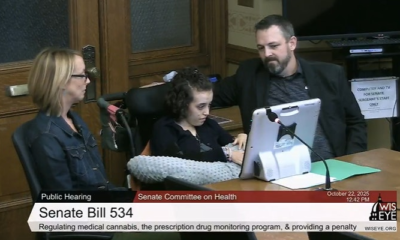Business
It’s Epilepsy Awareness Day as cannabis treatment studies continue
Published
7 months agoon

Purple Day, the international epilepsy awareness day, is today and it encourages people to wear purple and engage in activities to raise awareness about epilepsy. The modern-day cannabis industry was effectively launched when it was determined that medical marijuana was effective at treating the disease.
Going back in time, a 60 Minutes segment on the little girl Charlotte Figi, who suffered from a rare epileptic disease called Dravet Syndrome, took medical marijuana to treat her seizures. The segment featured Dr. Sanjay Gupta and demonstrated the quick effectiveness that a high-CBD and low-THC strain had on the child. Her seizures relented almost immediately. The powerful video footage prompted many legislators to consider medical marijuana as a treatment.

She was treated in Colorado with a strain that was initially called Hippie’s Disappointment because of its low THC level, but was eventually renamed Charlotte’s Web and was grown by the Stanley Brothers. Many families of children with the disease moved to the state for treatment and Colorado became ground zero for the creation of a regulated legal cannabis program.
Cannabis companies emerge
Charlotte’s Web
Charlotte’s Web (OTC: CWBHF) initially saw big success with its CBD products as the company was a well-respected brand with the connection to the high-profile story. However, massive competition has hurt the company. It recently reported earnings and Charlotte’s Web saw its full-year revenue decline by 21.4% versus 2023. The company reported $49.7 million in annual revenue for 2024, down from $63.2 million in 2023. Harking back to its medical days, the company also told investors it reached a regulatory milestone through its investment in DeFloria, which received FDA clearance in February 2025 to proceed with Phase 2 clinical trials for a botanical pharmaceutical candidate targeting symptoms of autism spectrum disorder.
DeFloria is a collaboration including Charlotte’s Web and Ajna BioSciences PBC, a botanical drug development company, to develop AJA001 as a treatment for irritability associated with autism spectrum disorder. AJA001 employs Charlotte’s Web proprietary full-spectrum cannabidiol (CBD) hemp extract derived from one of its patented cultivars. The company hopes for a botanical solution to the disorder, which would help even more children.
Jazz Pharmaceuticals
GW Pharmaceuticals really legitimized medical marijuana with its drug Epidiolex. This drug passed through the stringent FDA study trials and is now a prescription drug that treats rare pediatric epilepsy diseases, Dravet Syndrome and Lennox-Gastaut. It is often cited as a reason why cannabis should no longer be a Schedule 1 drug under the Controlled Substances Act. Jazz Pharmaceuticals (NASDAQ: JAZZ) acquired GW Pharmaceuticals in 2021 in a deal valued at $7.2 billion. Jazz recently reported that its net product sales of Epidiolex/Epidyolex in 2024 were $972.4 million, which represented 25% of its total net product sales for the year.
Tilray
Tiltay may be better known for its beverage products and its exports to Europe, but the company has a dedicated medical division, Tilray Medical, that focuses on medical cannabis research and development. Tilray’s 2:100 has been used off-label for patients as an alternative to Epidiolex. It sells in Canada for C$236 a bottle. The company ships its medical products across the world and it has supported and participated in clinical trials to study the efficacy of medical cannabis in treating epilepsy, including pediatric epilepsy.
Aurora Cannabis
In 2021, Aurora Cannabis Inc. (NASDAQ: ACB) launched Bidiol, the first medical cannabis oil in Uruguay that was wholly produced domestically. The oil is authorized by the Ministry of Public Health of Uruguay for the treatment of refractory epilepsy in children and adolescents.
Zynerba Pharmaceuticals
Zynerba produced Zygel, a CBD-based transdermal gel developed for Fragile X syndrome and other neuropsychiatric conditions, including some seizure disorders. The company was acquired by Harmony Biosciences and it continues the work on its synthetic CBD compound.
Looking Ahead
Two national NHS clinical trials are set to begin this year, focusing on the safety and effectiveness of cannabidiol (CBD) and tetrahydrocannabinol (THC) in adults and children with treatment-resistant epilepsy. It will be led by Professors Finbar O’Callaghan and Helen Cross from University College London (UCL) and Great Ormond Street Hospital (GOSH). According to Epilepsy Action, these trials aim to provide comprehensive data to address questions posed by the National Institute for Health and Care Excellence (NICE) regarding cannabinoid treatments.
Jazz Pharmaceuticals told investors it has initiated a Phase 3 trial to evaluate the efficacy and safety of Epidiolex in children and adolescents with Epilepsy with Myoclonic-Atonic Seizures (EMAS). This randomized, double-blind, placebo-controlled study aims to assess EMAS-associated seizure frequency over a 14-week treatment period.
A trial in Australia and New Zealand is investigating the use of a cannabidiol transdermal gel for adults with focal epilepsy. This study aims to assess the efficacy and safety of this novel delivery method for CBD in treating the most common, hard-to-treat epilepsy type in adults.
The American Epilepsy Society reported that an open observational prospective study in Buenos Aires included 55 patients with focal drug-resistant epilepsy. Participants began treatment with a purified CBD oil, titrated progressively up to 20 mg/kg/day over six months. The study aims to evaluate the monthly percentage change in seizure frequency.
The cannabis industry was spawned over the desire to help children who faced an unimaginable disease. Without their sacrifice, the industry likely wouldn’t exist in the form that it is in today.

Author: mscannabiz.com
MScannaBIZ for all you Mississippi Cannabis News and Information.
You may like
-


FDA Weighs Petition On ‘Significant Harm’ Of Marijuana Hair Testing Device’s Positive Results From Secondhand Smoke
-


Wisconsin Lawmakers Rally for Medical Cannabis Legalization in Committee Hearing
-


Massachusetts Campaign To Roll Back Marijuana Legalization Law Is ‘On Track’ To Make 2026 Ballot, Spokesperson Says
-


Village Farms Introduces Industry-First, One-Way Aroma Valve in Cannabis Packaging
-


Ohio House Passes Bill To Remove Voter-Approved Marijuana Legalization Protections And Restrict Hemp Market
-


Sorting Robotics Becomes Cannabis Manufacturing’s First True Systems Integrator
Business
Nebraska medical cannabis regulations stall in legislative committee
Published
6 months agoon
April 18, 2025

A Nebraska legislative committee voted 5-3 against advancing a bill designed to implement and regulate the state’s medical cannabis program, leaving legislators and advocates searching for alternative paths forward, according to the Nebraska Examiner.
The General Affairs Committee rejected Legislative Bill 677, sponsored by State Sen. Ben Hansen of Blair, during a Thursday vote where committee members declined to offer amendments to the legislation, the publication reported.
“I don’t want to shut all the doors right now, but some doors are closing, and they’re closing fast, and so we have to act,” Hansen told reporters after the vote, according to the Examiner.
Nebraska voters approved medical cannabis in November 2024, with residents legally permitted to possess up to 5 ounces with a healthcare practitioner’s recommendation since mid-December. However, the regulatory commission created by the ballot initiative lacks effective power and funding to regulate the industry.
Hansen described his legislation as “a must” for 2025 to prevent a “Wild West” scenario in the state’s cannabis market. The bill would have expanded regulatory structure through the Nebraska Medical Cannabis Commission and extended deadlines for regulations and licensing to allow more time for implementation, the Examiner noted.
Committee disagreements centered on proposed restrictions. A committee amendment would have prohibited smoking cannabis and the sale of flower or bud products while limiting qualified healthcare practitioners to physicians, osteopathic physicians, physician assistants or nurse practitioners who had treated patients for at least six months.
The amendment also would have limited qualifying conditions to 15 specific ailments including cancer, epilepsy, HIV/AIDS, and chronic pain lasting longer than six months.
State Sen. Bob Andersen of Sarpy County opposed allowing vaping due to concerns about youth drug use, while committee chair Rick Holdcroft suggested selling cannabis flower would be “a gateway toward recreational marijuana,” a claim Hansen “heavily disputed,” according to the Examiner.
Hansen now faces a difficult path forward, requiring at least 25 votes to pull the bill from committee and then needing 33 senators to advance it across three rounds of debate, regardless of filibuster attempts.
Crista Eggers, executive director of Nebraskans for Medical Marijuana, remained optimistic despite the setback.
“This will not be the end,” Eggers said, according to the outlet. “Giving up has never been an option. Being silenced has never been an option. It’s not over. It’s not done.”
The legislative impasse is further complicated by ongoing litigation. Former state senator John Kuehn has filed two lawsuits challenging the voter-approved provisions, with one appeal pending before the Nebraska Supreme Court. The state’s Attorney General is also trying to do something about the hemp question, akin to other states across the country.

Author: mscannabiz.com
MScannaBIZ for all you Mississippi Cannabis News and Information.
Business
One of Las Vegas’ cannabis lounges closes its doors
Published
6 months agoon
April 18, 2025

Nevada’s cannabis lounge experiment faces some expected growing pains, with one of just two state-licensed venues closing its doors after barely a year in business, according to the Las Vegas Weekly.
“The regulatory framework, compliance costs and product limitations just don’t support a sustainable business model,” said Thrive Cannabis managing partner Mitch Britten, who plans to convert the space into an event venue until regulations loosen up.
The closure leaves Planet 13’s Dazed Consumption Lounge as the only operational state-regulated cannabis lounge in Nevada. Dazed manager Blake Anderson estimates the venue attracts around 250 customers daily, primarily tourists. One other establishment, Sky High Lounge, has operated since 2019 on sovereign Las Vegas Paiute Tribe land exempt from state regulations.
Even with Nevada regulators conditionally approving 21 more lounge licenses, potential owners are struggling to meet the $200,000 liquid assets requirement – particularly social equity applicants from communities hit hardest by prohibition.
Recreational marijuana has been legal statewide since 2017, but public consumption remains prohibited. That’s created an obvious disconnect for the millions of tourists who visit Las Vegas annually but have nowhere legal to use the products they purchase. The state recorded roughly $829 million in taxable sales during the 2024 fiscal year.
“It always comes down to money, and it’s difficult to get a space if you can’t afford to buy a building. On top of that, getting insurance and finding a landowner who’s willing to lease to a cannabis business is a challenge in and of itself,” said Christopher LaPorte, whose consulting firm Reset Las Vegas helped launch Smoke and Mirrors, told Las Vegas Weekly.
Many think the key to future success lies in legislative changes that would allow lounges to integrate with food service and entertainment – playing to Las Vegas’s strengths as a hospitality innovator. In the meantime, the industry will continue to adapt and push forward.
“Things take time,” LaPorte said. “There’s a culture that we have to continue to embrace and a lot of education that we still have to do. But at the end of the day, tourists need a place to smoke, and that’s what these places are.”

Author: mscannabiz.com
MScannaBIZ for all you Mississippi Cannabis News and Information.


Psyence Group Inc. (CSE: PSYG) told investors that it will be consolidating all of its issued and outstanding share capital on the basis of every 15 existing common shares into one new common share effective April 23, 2025 with a record date of April 23, 2025. As a result of the consolidation, the issued and outstanding shares will be reduced to approximately 9,387,695 on the effective date.
This is the second time a Psyence company has consolidated shares recently. In November, its Nasdaq-listed associate, Psyence Biomedical Ltd. (Nasdaq: PBM), implemented a 1-for-75 share consolidation as the psychedelics company worked to maintain its Nasdaq listing.
Psyence Group reported earnings in February when the company delivered a net loss of C$3 million and was reporting as a going concern. At the end of 2024, the company said it had not yet achieved profitable operations, has accumulated losses of C$48,982,320 since its inception.
Total assets at the end of 2024 were C$11,944,478 and comprised predominantly of: cash and cash equivalents of C$10,611,113, other receivables of C$159,808, investment in PsyLabs of C$1,071,981 and prepaids of C$68,243.
Still, the company is pushing ahead. Psyence told investors that it has historically secured financing through share issuances and convertible debentures, and it continues to explore funding opportunities to support its operations and strategic initiatives. “Based on these actions and
management’s expectations regarding future funding and operational developments, the company believes it will have sufficient resources to meet its obligations as they become due for at least the next twelve months,” it said in its last financial filing.
The company said it believes that the consolidation will position it with greater flexibility for the development of its business and the growth of the company.

Author: mscannabiz.com
MScannaBIZ for all you Mississippi Cannabis News and Information.

FDA Weighs Petition On ‘Significant Harm’ Of Marijuana Hair Testing Device’s Positive Results From Secondhand Smoke

Wisconsin Lawmakers Rally for Medical Cannabis Legalization in Committee Hearing

Massachusetts Campaign To Roll Back Marijuana Legalization Law Is ‘On Track’ To Make 2026 Ballot, Spokesperson Says

Village Farms Introduces Industry-First, One-Way Aroma Valve in Cannabis Packaging

Ohio House Passes Bill To Remove Voter-Approved Marijuana Legalization Protections And Restrict Hemp Market

Sorting Robotics Becomes Cannabis Manufacturing’s First True Systems Integrator

Wisconsin Senators Hold Hearing On GOP Leader’s New Medical Marijuana Legalization Bill

Tariffs And Visas Add To The Cannabis Industry’s Misery

Rhode Island Cannabis Chair Steps Down; Adult-Use Dispensary Awards Months Away

How America Accidentally Legalized Lab Cannabis

New Hampshire Lawmakers Announce Plans For Marijuana, Psychedelics And Hemp Bills For 2026 Session

Metrc Announces In-Person Events in New York to Prepare Licensees For Track-and-Trace Implementation

Top Rhode Island Marijuana Regulator Steps Down Ahead Of Possible Campaign For Attorney General

Lifestyle Brand Cookies Launches in Brazil With Premium Wellness Products

Alcohol companies lobby Congress on cannabis drinks (Newsletter: October 22, 2025)

Millennials Are Spending Big on Luxury Travel

Ohio Lawmakers Advance Bill To Scale Back Voter-Approved Marijuana Law And Impose Hemp Regulations

Data Confirms Cannabis Is Safer Than Alcohol

American Council of Cannabis Medicine Unveils Major Industry Initiative to Expand Medical Cannabis Access

Scientists Develop New Class Of CBD Using A Common Kitchen Spice—Not Cannabis

Evidence About Burning Mouth Syndrome And Cannabinoids

Raw Garden Acquires ‘California Love’ to Grow Clean Cannabis Movement

Rhode Island Marijuana Officials Approve Timeline For Awarding New Dispensary Licenses

‘Rent-a-License’ Scheme Highlights New York Cannabis’s Track-and-Trace Problem

Alert: Department of Cannabis Control updates data dashboards with full data for 2023

Connecticut Appoints The US’s First Cannabis Ombudsperson – Yes there is a pun in there and I’m Sure Erin Kirk Is Going To Hear It More Than Once!

5 best CBD creams of 2024 by Leafly

Recreational cannabis on ballot for third time in South Dakota

EU initiative begins bid to open access to psychedelic therapies
New Study Analyzes the Effects of THCV, CBD on Weight Loss

Free delta-9 gummies from Bay Smokes

5 best autoflower seed banks of 2024 by Leafly

Discover New York’s dankest cannabis brands [September 2024]

May 2024 Leafly HighLight: Pink Runtz strain

Press Release: CANNRA Calls for Farm Bill to Clarify Existing State Authority to Regulate Hemp Products

5 best THC drinks of 2024 by Leafly

Local medical cannabis dispensary reacts to MSDH pulling Rapid Analytics License – WLBT

6 best CBD gummies of 2024 by Leafly

Curaleaf Start Process Of Getting Their Claws Into The UK’s National Health System – With Former MP (Resigned Today 30/5/24) As The Front Man

Horn Lake denies cannabis dispensary request to allow sale of drug paraphernalia and Sunday sales | News

5 best delta-9 THC gummies of 2024 by Leafly

Mississippi city official pleads guilty to selling fake CBD products

The Daily Hit: October 2, 2024

Nevada CCB to Accept Applications for Cannabis Establishments in White Pine County – “Only one cultivation and one production license will be awarded in White Pine County”

5 best THCA flower of 2024 by Leafly

Weekly Update: Monday, May 13, 2024 including, New Guide for Renewals & May Board meeting application deadline

6 best hemp pre-rolls of 2024 by Leafly

PRESS RELEASE : Justice Department Submits Proposed Regulation to Reschedule Marijuana
Trending
-

 California Cannabis Updates1 year ago
California Cannabis Updates1 year agoAlert: Department of Cannabis Control updates data dashboards with full data for 2023
-

 Breaking News1 year ago
Breaking News1 year agoConnecticut Appoints The US’s First Cannabis Ombudsperson – Yes there is a pun in there and I’m Sure Erin Kirk Is Going To Hear It More Than Once!
-

 best list1 year ago
best list1 year ago5 best CBD creams of 2024 by Leafly
-

 Business1 year ago
Business1 year agoRecreational cannabis on ballot for third time in South Dakota
-

 Business1 year ago
Business1 year agoEU initiative begins bid to open access to psychedelic therapies
-

 cbd1 year ago
cbd1 year agoNew Study Analyzes the Effects of THCV, CBD on Weight Loss
-

 Bay Smokes1 year ago
Bay Smokes1 year agoFree delta-9 gummies from Bay Smokes
-

 autoflower seeds1 year ago
autoflower seeds1 year ago5 best autoflower seed banks of 2024 by Leafly
